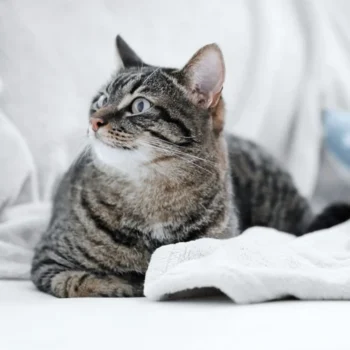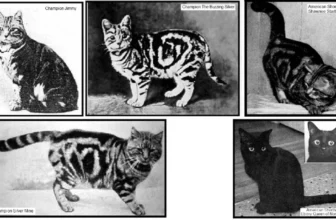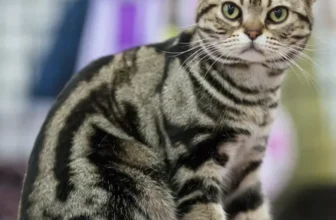As cat owners, we want our furry friends to live long, healthy lives. However, sometimes it can be difficult to know how to ensure that they stay in tip-top shape. This is where regular vet check-ups come in. But what are the benefits of these check-ups, particularly for American Shorthair cats? In this article, we’ll delve into the importance of regular vet visits for American Shorthair cats, what happens during the visits, how often you should take your cat to the vet, and how to prepare for the visit. We’ll also take a look at some common health issues that American Shorthairs may face. Let’s get started!
The Importance of Regular Vet Check-ups for American Shorthair Cats
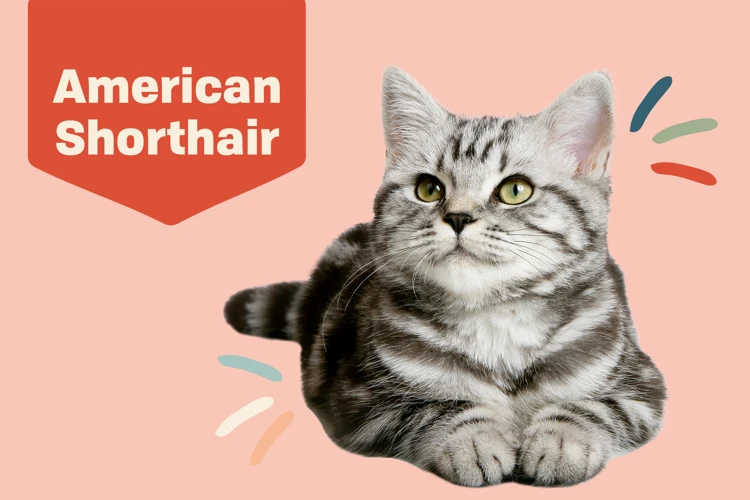
Caring for your American Shorthair cat is one of the most important responsibilities as a pet owner. While ensuring they receive adequate nutrition and exercise is critical in maintaining good health, one thing that should not be overlooked is regular vet check-ups. These check-ups play a crucial role in preventing potential health problems from arising, as well as identifying any current issues that your cat may have. In this article, we will explore the significance of regular vet check-ups for American Shorthair cats, including the benefits of prevention and early detection of health issues, personalized healthcare plans, and the importance of blood and urine tests. Additionally, we will also cover common health issues for this breed and how often you should take your cat to the vet. So let’s get started and learn how to ensure your American Shorthair cat will live a long and healthy life. If you’re interested, you can also learn more about creating a balanced diet for your cat.
Prevention of Health Issues
Regular vet check-ups are vital for the overall health and well-being of your American Shorthair cat. One of the most significant benefits of such check-ups is the prevention of health issues. Preventive care can help your cat to avoid numerous health problems, which can lead to a happier and healthier life.
During a check-up, your vet can identify any potential health concerns and discuss diet, exercise, and other essential components of your cat’s care, which can help to prevent health issues such as obesity, dental disease, hypertension, and kidney disease.
By catching these issues early on, you can prevent more serious complications from arising down the road. Preventive care is also much less expensive than treating a disease or illness once it has advanced. In this way, regular check-ups with your vet can save you time, money, and distress.
Preventive care is also important because some health problems may not show outward symptoms until the problem has already become severe and difficult to treat. Regular check-ups with your vet will help to identify any conditions that may be developing under the surface, allowing for earlier detection and treatment, ultimately improving your cat’s chances of recovery.
The prevention of health issues is a crucial benefit of regular vet check-ups for American Shorthair cats. Implementing preventive measures, such as frequent check-ups with your vet, can help keep your cat healthy and happy for years to come.
Early Detection of Health Issues
Regular vet check-ups for your American Shorthair cat can help in the early detection of any health issues. The importance of early detection cannot be overstated as it can make all the difference when it comes to the successful treatment of any health condition. Some health issues may not have any noticeable symptoms until they are in their advanced stages, and by then, they may be difficult to treat or even untreatable. Early detection can prevent this from happening.
During a check-up, the veterinarian will examine your cat’s physical condition, including the eyes, ears, nose, mouth, skin, and coat. They will also listen to your cat’s heartbeat and breathing and check their weight. Any lumps, bumps or abnormalities will be noted, and any suspicion of a health issue will be investigated further. This includes running blood and urine tests.
Early detection is particularly important for senior cats, as they are more prone to age-related health issues such as arthritis, kidney disease and cancer.
As a responsible pet owner, it is essential to be on the lookout for any changes in your American Shorthair cat’s behavior or physical condition. These may include changes in weight, appetite, thirst, litter-box habits, or energy levels. These changes could be indications that something is wrong. By taking your cat to the vet for regular check-ups, any health issues can be caught early, and treatment can be started before the condition deteriorates further.
As a result, your cat can enjoy a longer, healthier life. Regular check-ups can help keep your cat healthy and active so that they can continue to bring joy and companionship into your life.
For more information on keeping your American Shorthair cat active and healthy, check out our article on “Keeping Your American Shorthair Cat Active and Healthy.”
Personalized Healthcare Plan
During a regular vet check-up, your American Shorthair cat’s veterinarian will help to develop a personalized healthcare plan for your cat. This healthcare plan is tailored to your cat’s individual needs and takes into account any previous health concerns or conditions. It will also help to prevent any future health problems from developing.
Why is a personalized healthcare plan important?
A personalized healthcare plan is important because it ensures that your American Shorthair cat is receiving the best possible care. With a personalized healthcare plan, your cat’s veterinarian will be able to identify any potential health issues before they become major problems.
What does a personalized healthcare plan include?
A personalized healthcare plan for your American Shorthair cat will include details about their diet, exercise regimen, and any medications they are taking. It will also include a schedule for regular check-ups and any necessary procedures or tests.
Here is an example of what a personalized healthcare plan for an American Shorthair cat might look like:
| Aspect of Care | Description |
|---|---|
| Diet | Feed a high-quality, balanced diet appropriate for age and weight |
| Exercise | Encourage exercise through playtime and interactive toys |
| Medications | Administer medications as prescribed by the veterinarian |
| Check-ups | Develop a schedule for regular check-ups |
| Procedures/Tests | Include any necessary procedures or tests in the plan |
By following a personalized healthcare plan for your American Shorthair cat, you can help to ensure that they live a long, healthy, and happy life. And if any new health concerns arise, your cat’s veterinarian can adjust the plan accordingly to meet their changing needs.
Blood and Urine Tests
During a vet check-up, your American Shorthair cat may undergo blood and urine tests. These tests provide insight into your cat’s overall health and can aid in the early detection of health issues. Let’s take a closer look at each of these tests.
Blood Tests
Blood tests are a common part of a vet check-up for American Shorthair cats. These tests can help detect a variety of health issues, including anemia, infections, and organ dysfunction. The most commonly performed blood test is a complete blood count (CBC), which provides information on the number and type of blood cells in the sample. Other blood tests may include a chemistry panel, which measures certain chemicals in the blood, such as glucose and electrolytes.
Urine Tests
Urine tests are another important tool in the detection of health issues in American Shorthair cats. A urinalysis can provide information on your cat’s kidney function and detect urinary tract infections or other issues. During a urinalysis, your vet will look for abnormalities such as the presence of blood or protein in the urine. They may also perform a urine culture to identify any potential infections.
| Blood Tests | Urine Tests |
|---|---|
| Complete blood count (CBC) | Urinalysis |
| Chemistry panel | Urine culture |
It’s important to remember that blood and urine tests are just one part of a comprehensive vet check-up for your American Shorthair cat. These tests can help identify potential health issues, but they do not provide a complete picture of your cat’s health. Regular check-ups with your vet, combined with a healthy diet and regular exercise, are the best way to keep your American Shorthair cat healthy and happy.
What Happens During a Vet Check-up?
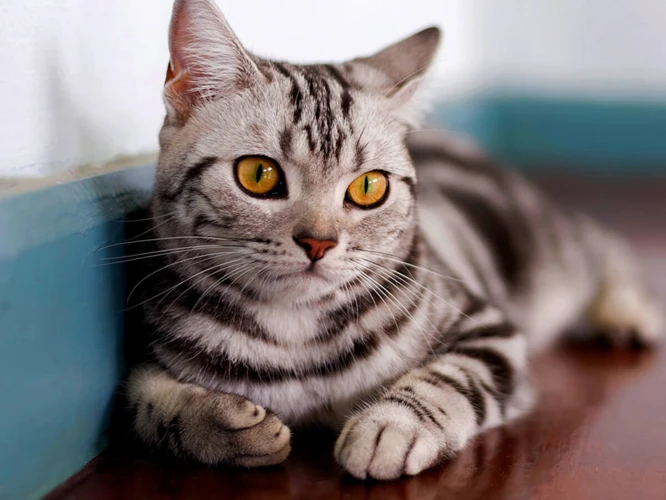
Curious about what typically happens at a vet check-up for your American Shorthair cat? The process can seem daunting, especially if you’ve never taken your furry friend to the vet before. But have no fear, vet check-ups are a crucial aspect of maintaining your cat’s health. In this section, we will walk you through the main components of a typical vet check-up, so you’ll know what to expect and understand the importance of each step.
Physical Exam
During a physical exam, the vet will thoroughly check your American Shorthair Cat for any potential health issues. This is a crucial part of a regular vet check-up and aims to assess the overall health of your cat. Here are some of the things your vet will look for during a physical exam:
| Body Condition | The vet will assess your cat’s body condition and weight. This can help determine if your cat is at a healthy weight or if they need to lose or gain some extra pounds. |
| Coat and Skin | The vet will examine your cat’s coat and skin to check for any signs of redness, inflammation, or irritation. They will also check for presence of fleas, ticks or other parasites. |
| Ears | The vet will examine your cat’s ears for any signs of infection or ear mites. Ear infections can cause itching, head shaking or discharge. |
| Eyes | The vet will exam your cat’s eyes for any signs of irritation, infection or any possibility of developing cataracts. Detection and treatment of such conditions are critical to preserving your cat’s vision. |
| Mouth and Teeth | The vet will check your cat’s teeth and gums, looking for signs of disease or decay. Dental health is an important part of your cat’s overall health and can prevent potentially serious issues like heart disease or kidney problems. |
| Heart and Lungs | The vet will listen to your cat’s heart and lungs using a stethoscope, checking for any signs of irregularities, murmurs, or wheezing. |
| Abdomen | The vet will palpate your cat’s abdomen to check for any pain or unusual lumps. They may also use ultrasound to evaluate the internal organs. |
A physical exam is an important way to detect any health issues early and is an essential aspect of maintaining your American Shorthair Cat’s health in the long run.
Blood and Urine Tests
During a vet check-up, a veterinarian often performs blood and urine tests to assess a cat’s overall health. Both tests can provide valuable information about a cat’s internal organ function and detect potential health issues before noticeable symptoms appear.
Blood tests can assess a cat’s liver and kidney function, blood sugar levels, thyroid function, and detect anemia. Anemia, which is a deficiency of red blood cells, can occur as a result of various underlying health conditions, including infections and autoimmune diseases. A blood test can also detect infections, such as feline immunodeficiency virus (FIV) and feline leukemia virus (FeLV).
Urine tests can detect early signs of kidney disease, urinary tract infections, and diabetes. Kidney disease, in particular, can be prevalent in American Shorthair cats and early detection can be key in managing and potentially slowing down the progression of the disease. Additionally, a urine test can detect the presence of crystals, which can lead to bladder stones or blockages in male cats.
It is important to note that blood and urine tests are not only useful for detecting current health issues but also for monitoring chronic conditions. For example, cats with diabetes need regular blood sugar monitoring through blood tests to ensure their treatment is effective.
Blood and urine tests can provide vital information about a cat’s health, and early detection of potential issues can lead to more successful treatment and management.
Additional Tests
During a regular check-up, your American Shorthair cat may require additional tests, depending on their age and overall health. Additional tests can help your vet detect any underlying health issues that may not be apparent during the physical exam or basic blood and urine tests.
Types of Additional Tests
| X-rays | X-rays can be used to check for any growths, tumors, or blockages in your cat’s organs. This can help detect any potential health issues early on, allowing for prompt treatment. |
| Ultrasound | An ultrasound is a non-invasive imaging test that uses high-frequency sound waves to capture images of your cat’s internal organs. It can be useful in detecting underlying health issues such as tumors, cysts, or stones. |
| EKG | An electrocardiogram (EKG) is used to measure your cat’s heart rate and rhythm. This test is commonly used to detect heart disease or abnormalities. |
| Blood Pressure Monitoring | Monitoring your cat’s blood pressure can help detect hypertension, which is common in older cats. High blood pressure can lead to a variety of health issues, including kidney disease, blindness, and heart problems. |
| Fecal Exam | A fecal exam involves analyzing your cat’s stool to check for any signs of parasites, bacterial infections, or other gastrointestinal issues. Parasites, such as roundworms and tapeworms, can cause a variety of health problems in cats. |
Your vet may recommend additional tests based on the findings from the physical exam and basic blood and urine tests. While additional tests may add to the cost of the check-up, they can provide valuable information about your cat’s overall health and help detect potential health issues early on. By staying on top of your cat’s health, you can ensure that they receive the best possible care and lead a happy, healthy life.
How Often Should I Take My American Shorthair Cat to the Vet?
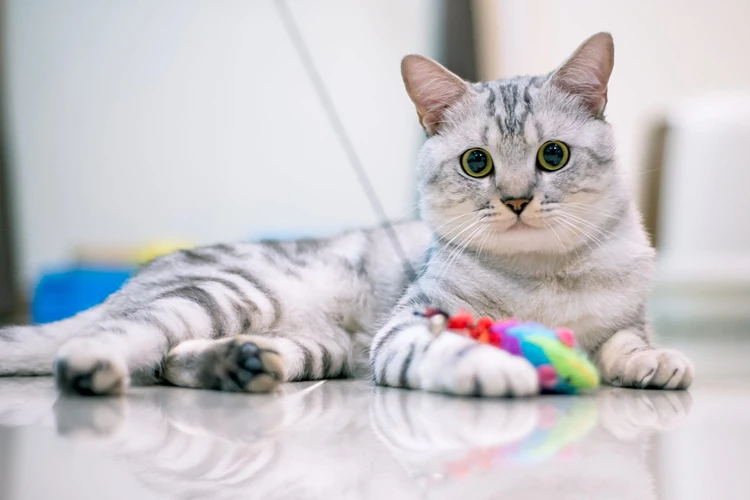
The frequency of vet check-ups for your American Shorthair cat can depend on various factors such as age, overall health condition, and preexisting medical conditions. As a general recommendation, it is recommended to take your cat to the vet once a year for regular check-ups.
However, if your cat is older or has health issues, the vet might suggest more frequent visits. For example, older cats (over the age of 7) might require twice-yearly check-ups to detect any age-related health problems. Similarly, if your cat has a chronic medical condition such as kidney disease or diabetes, more frequent vet visits may be necessary to manage their condition and prevent complications.
It is important to note that cats are masters of hiding their illnesses, meaning that they generally won’t show signs of being sick until the condition has progressed. This is why regular vet check-ups are crucial to detect and treat any potential health issues as early as possible, even if your cat appears to be healthy and playful at home.
If your cat has just been adopted or has not been to the vet in a while, it is crucial to schedule a check-up as soon as possible to ensure that they are up-to-date on their vaccinations and are overall in good health.
Remember, routine vet check-ups play a vital role in your American Shorthair cat’s overall health and well-being. Consult with your vet to determine the appropriate frequency of visits based on your cat’s individual needs.
Preparing for a Vet Check-up
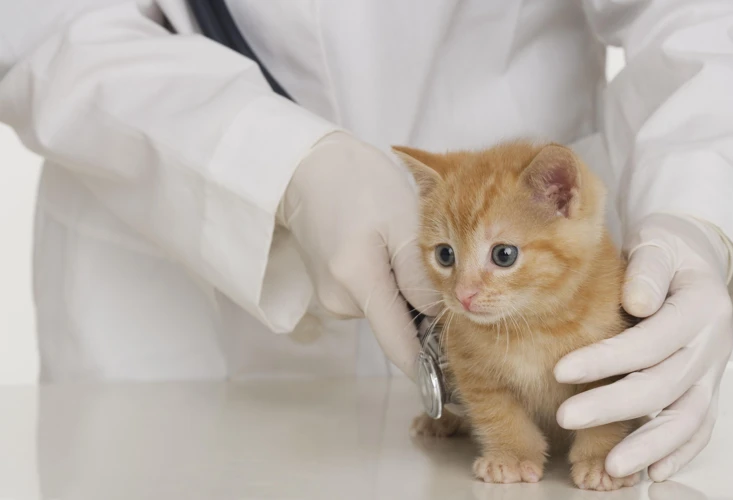
A visit to the vet can be a daunting experience, not just for American Shorthair cats but also their owners. However, being well-prepared for the appointment can help ease the tension and ensure that both you and your furry friend get the most out of the check-up. So, before heading to the clinic, consider taking a few simple steps to put your mind at ease. Here are some tips for preparing your American Shorthair cat for a vet check-up.
Make a List of Questions
Before taking your American Shorthair cat to the vet, it’s important to make a list of questions that you have for the veterinarian. This will help ensure that you get all the information you need from the appointment. Here are some questions to consider adding to your list:
- What is my cat’s ideal weight? Your veterinarian can help you determine if your cat is at a healthy weight and provide recommendations for a balanced diet.
- How often should I be feeding my cat? Your vet can advise you on the proper feeding schedule and portion sizes for your cat’s individual needs.
- What vaccinations does my cat need? Vaccinations can vary by location and lifestyle, so it’s important to discuss with your vet which ones are necessary for your cat.
- What should I do if I notice a change in my cat’s behavior? Changes in behavior can be a sign of an underlying medical issue, so it’s important to know what to look out for and how to respond.
- What kind of exercise is best for my cat? Regular exercise is crucial to keeping your cat healthy and happy, but not all exercises are appropriate for every cat. Your vet can recommend activities tailored to your cat’s needs.
By coming prepared with a list of questions, you can be sure that you’re getting the most out of your vet appointments and giving your American Shorthair cat the best possible care.
Bring Your Cat’s Medical History
Before taking your American Shorthair cat to the vet, it’s important to bring along their medical history. This information will help your veterinarian have a better understanding of your cat’s past medical issues and current health status. You can request a copy of your cat’s medical history from any previous vet visits or keep track of it yourself.
What to include in your cat’s medical history:
| Vaccination records | Include the date of each vaccination and which vaccine was administered. |
| Previous medical issues | Note any previous health issues, medications prescribed, and treatments administered. |
| Chronic conditions | If your cat has any chronic conditions, such as diabetes or kidney disease, make sure to mention them in the medical history. |
| Allergies | List any medications or foods your cat is allergic to. |
| Recent changes | Note any recent changes in your cat’s behavior or health status. This can include changes in appetite, weight, or activity level. |
| Surgeries | If your cat has had any previous surgeries, make sure to include the date and reason for the procedure. |
Providing your cat’s medical history can help your veterinarian make a more accurate diagnosis and catch any potential health issues early on. It also helps to establish a baseline for your cat’s health so that any changes can be identified and addressed promptly. Remember to update your cat’s medical history after each vet visit to ensure your vet has the most up-to-date information.
Consider Your Cat’s Behavior
When preparing for your American Shorthair cat’s vet check-up, it’s important to consider their behavior and any changes that you may have noticed. Your cat’s behavior can be a key indicator of their overall health and can provide clues as to whether they may be experiencing any physical or emotional issues. Here are some tips for considering your cat’s behavior before their check-up:
| Eating habits: | Has your cat’s appetite changed? Are they eating more or less than usual? Are they having difficulty eating or swallowing? |
| Elimination habits: | Is your cat urinating or defecating more or less frequently than usual? Have you noticed any changes in the urine or stool’s color or consistency? Are they having difficulty using the litter box? |
| Activity level: | Has there been a change in your cat’s activity level? Are they sleeping more than usual? Are they less interested in play or exercise? |
| Breathing: | Do you notice any changes in your cat’s breathing patterns or sounds? |
| Mental state: | Do you notice any changes in your cat’s behavior or attitude? Are they more anxious or aggressive than usual? |
By considering your American Shorthair cat’s behavior before their vet check-up, you can provide essential information to your veterinarian and help ensure that your cat receives the personalized care they deserve. Don’t hesitate to discuss any concerns you may have with your vet as they can provide guidance and support to manage any issues and keep your cat healthy and happy.
Bring a Carrier
It’s important to safely transport your American Shorthair cat to the vet, and this requires a carrier. A carrier is a secure and comfortable way to transport your cat and helps them feel safe and secure during the trip. If you don’t have a carrier, it’s important to get one before your cat’s next check-up.
Here are some things to consider when choosing a carrier for your American Shorthair cat:
| Factor | Consideration |
|---|---|
| Size | Make sure the carrier is big enough for your cat to stand up, turn around, and lie down in comfortably. |
| Material | Choose a carrier that is made of sturdy, non-toxic materials. Soft-sided carriers are a great option as they provide some flexibility and often have additional pockets for storage. |
| Accessibility | Look for a carrier that is easy to open and close, with secure latches. |
| Comfort | Choose a carrier with a soft, padded bottom and good ventilation. You may also want to consider adding a familiar blanket or toy to help your cat feel more comfortable. |
| Cleaning | Make sure the carrier is easy to clean in case of accidents or spills. |
Remember to acclimate your cat to the carrier before the vet visit, so they feel comfortable and safe inside it. Leave the carrier out in a quiet area of your home and put treats, toys, and blankets inside to encourage them to explore and become accustomed to it. This will make the vet visit less stressful for both you and your American Shorthair cat.
Common Health Issues in American Shorthair Cats
As pet owners, we want to ensure the best possible health for our furry friends. However, even with regular vet check-ups, American Shorthair cats are still susceptible to certain health issues. It’s important to stay informed about the common health problems these cats can experience, so you can be proactive and keep your cat healthy and happy. Let’s take a closer look at some of the frequent health concerns for American Shorthair cats.
Obesity
One of the most common health issues that American Shorthair cats face is obesity. Obesity is a result of excess body fat, which puts a strain on your cat’s cardiovascular system, joints, and organs. Here are a few important facts to know about obesity in cats:
- Causes: Obesity in cats can be caused by overfeeding or overeating, lack of physical activity, or genetics. It can also be caused by underlying health conditions such as hypothyroidism or diabetes.
- Signs and Symptoms: Look out for signs of weight gain, difficulty moving around, lethargy, and changes in appetite. If you notice any of these symptoms, it’s important to consult your vet.
- Health Risks: Obese cats are prone to several health risks, such as diabetes, urinary tract disease, heart disease, and respiratory problems.
Preventing obesity in your cat starts with proper nutrition and exercise. Feeding a balanced diet and monitoring portion sizes is crucial in maintaining a healthy weight. Encouraging playtime and physical activity is also important to keep your cat active and fit.
If your cat is already obese, your vet can help you develop a weight loss plan. This plan may include adjusting your cat’s diet, increasing exercise, and regularly monitoring progress. It’s important to note that sudden weight loss in cats can also be dangerous, so a gradual weight loss plan is recommended.
Obesity is a serious health issue for American Shorthair cats. It can negatively impact their overall health and longevity. By monitoring your cat’s nutrition and physical activity, and getting regular check-ups with your vet, you can help prevent and manage obesity in your beloved pet.
Dental Disease
Dental disease is a common health issue that American Shorthair cats can face, and it’s important to catch it early on in order to prevent further complications. According to the American Veterinary Dental College, around 70% of cats will have some form of dental disease by the age of three. This makes regular dental check-ups an important part of maintaining your cat’s overall health and well-being.
What causes dental disease in cats?
Dental disease in cats is caused by the buildup of plaque and tartar on their teeth, which can lead to inflammation and infection of the gums. This can cause painful conditions such as gingivitis and periodontal disease, which can lead to tooth loss if left untreated. Other factors that can contribute to dental disease in cats include poor diet, genetics, and age.
Signs of dental disease in cats
It’s important to keep an eye out for any signs of dental disease in your American Shorthair cat, as they can be very good at hiding their pain. Some common signs to look out for include:
- Bad breath
- Difficulty eating or chewing
- Red, swollen, or bleeding gums
- Loose or missing teeth
- Discolored or dirty teeth
How can dental disease be prevented?
Regular dental check-ups and cleanings are crucial in preventing dental disease in cats. During a dental exam, your vet will look for any signs of dental disease, and may recommend a dental cleaning or other treatment if necessary. It’s also important to brush your cat’s teeth regularly at home, and to provide them with a healthy diet that promotes good oral health.
Treatment for dental disease in cats
If dental disease is detected during a check-up, your vet may recommend a dental cleaning or other treatment to address the issue. This might include a deep cleaning under anesthesia, the removal of any diseased or infected teeth, or other treatments as needed. It’s important to follow your vet’s recommendations and to maintain regular check-ups in order to prevent further complications from dental disease.
Dental disease is a serious issue that can have long-term effects on your American Shorthair cat’s health and well-being. By staying vigilant and providing regular dental care, you can help prevent dental disease and keep your cat healthy and happy for years to come.
| Signs of Dental Disease in Cats | Ways to Prevent Dental Disease in Cats |
|---|---|
| Bad breath | Regular dental check-ups and cleanings |
| Difficulty eating or chewing | Regular at-home teeth brushing |
| Red, swollen, or bleeding gums | Healthy diet that promotes good oral health |
| Loose or missing teeth | |
| Discolored or dirty teeth |
Hypertension
Hypertension, commonly known as high blood pressure, can also affect American Shorthair Cats. This condition can lead to serious health issues such as heart disease, kidney disease, and blindness. Regular vet check-ups can help detect high blood pressure early, allowing for effective treatment to prevent further complications.
Some of the common signs of hypertension in cats include increased thirst and urination, loss of appetite, and changes in behavior. During a vet check-up, the vet will measure your cat’s blood pressure using a blood pressure cuff designed for cats. High blood pressure in cats is defined as a systolic pressure of greater than 160 mm Hg.
Treatment for hypertension may include medication, changes in diet, and monitoring your cat’s blood pressure regularly. Medications, such as ACE inhibitors or calcium channel blockers, are commonly used to lower blood pressure in cats. In severe cases, hospitalization may be required to stabilize your cat’s blood pressure.
Preventing hypertension in American Shorthair Cats involves maintaining a healthy weight, feeding a balanced and nutritious diet, and addressing any underlying health conditions that may contribute to high blood pressure. Regular exercise, avoiding stress, and ensuring your cat drinks enough water can also help prevent hypertension.
It is important to discuss any concerns you may have about your cat’s health with your vet, including potential signs of hypertension. Regular vet check-ups can help detect high blood pressure early, allowing for effective treatment and preventing further complications in your cat’s health.
| Signs of Hypertension in Cats | Treatment for Hypertension in Cats | Prevention of Hypertension in Cats |
|---|---|---|
| – Increased thirst and urination – Loss of appetite – Changes in behavior |
– Medications such as ACE inhibitors or calcium channel blockers – Changes in diet – Monitoring blood pressure regularly |
– Maintaining a healthy weight – Balanced and nutritious diet – Regular exercise – Avoiding stress – Ensuring sufficient water intake |
Kidney Disease
Chronic kidney disease is a common health issue that affects American Shorthair cats. It occurs when the kidneys start to lose their ability to function properly over time, leading to a buildup of toxins and waste products in the cat’s body.
If left untreated, chronic kidney disease can lead to serious complications, including kidney failure and even death. It is important to take your American Shorthair cat for regular vet check-ups to catch any signs of kidney disease early on.
During a routine vet visit, your vet may conduct blood and urine tests to measure kidney function. Some common symptoms of kidney disease in cats include increased thirst and urination, vomiting, weight loss, and lethargy.
One way to help prevent kidney disease in cats is to provide them with a balanced diet that is rich in high-quality protein and low in phosphorus. Your vet can recommend a healthy diet plan for your American Shorthair cat based on their specific needs and any existing health conditions.
If your cat is diagnosed with kidney disease, there are various treatment options available, including medication and dietary changes. Your vet can work with you to develop a personalized treatment plan that will help manage the disease and prolong your cat’s lifespan.
In addition to regular vet check-ups and a healthy diet, providing your American Shorthair cat with plenty of fresh water can also help prevent kidney disease. Encourage your cat to drink by offering water in different locations throughout your home and investing in a high-quality water fountain.
The table below summarizes the key points to remember about kidney disease in American Shorthair cats:
| Kidney Disease in American Shorthair Cats | |
| Symptoms | Increased thirst and urination, vomiting, weight loss, and lethargy |
| Prevention | Provide a balanced diet that is low in phosphorus and high in high-quality protein; offer plenty of fresh water |
| Treatment | Medication and dietary changes; work with your vet to develop a personalized treatment plan |
By taking a proactive approach to your American Shorthair cat’s health, you can help ensure that they live a long and happy life free from complications associated with kidney disease. Remember to schedule regular vet check-ups, provide a healthy diet and plenty of fresh water, and pay attention to any signs or symptoms that may indicate a problem with kidney function.
Conclusion
In conclusion, regular vet check-ups are crucial for maintaining the health and well-being of American Shorthair cats. These check-ups can prevent and detect health issues early on, allowing for timely treatment and potentially saving your cat’s life. By establishing a personalized healthcare plan with your veterinarian, you can address any specific health concerns your American Shorthair cat may have and make informed decisions regarding their care.
It is recommended that American Shorthair cats receive annual check-ups, but the frequency may vary depending on the cat’s age and health status. It is important to make sure you are prepared for each check-up by bringing a list of questions, your cat’s medical history, and considering your cat’s behavior.
Common health issues in American Shorthair cats include obesity, dental disease, hypertension, and kidney disease. By keeping up with regular check-ups and addressing potential health concerns early on, you can prevent these issues from becoming more serious and potentially life-threatening.
Overall, taking your American Shorthair cat to the vet for regular check-ups is essential for their health and well-being. By making sure they receive the proper care and attention they need, you can ensure they live a long and healthy life by your side.
Frequently Asked Questions
1. Why should I take my American Shorthair cat to the vet regularly?
Regular vet check-ups can help prevent health issues, detect early signs of illnesses, and provide a personalized healthcare plan for your cat.
2. How often should I take my American Shorthair cat to the vet?
You should take your cat to the vet at least once a year for a check-up. However, if your cat is a senior or has a health condition, more frequent visits may be necessary.
3. What happens during a physical exam at the vet?
The vet will examine your cat’s eyes, ears, nose, mouth, skin, fur, and behavior. They will also listen to their heart and lungs, palpate their abdomen, and check their paws and claws.
4. What blood and urine tests will my vet perform?
Your vet may perform a complete blood count (CBC), chemistry panel, thyroid hormone test, and urinalysis to evaluate your cat’s overall health, organ function, and potential medical issues.
5. What are some additional tests my vet may suggest?
Your vet may suggest radiographs (X-rays), ultrasounds, echocardiograms (heart exams), or other specialized tests depending on your cat’s age, health history, and symptoms.
6. Can my vet create a personalized healthcare plan for my cat?
Yes. Based on your cat’s medical history and current health, your vet can create a tailored healthcare plan that includes preventive care, nutrition, exercise, and treatment options.
7. What should I bring to my cat’s vet appointment?
You should bring a list of questions, your cat’s medical history, any medications your cat is taking, and a carrier to transport your cat safely.
8. What are some common health issues in American Shorthair cats?
Common health issues in American Shorthair cats include obesity, dental disease, hypertension, and kidney disease. Early detection and treatment can improve your cat’s overall health and lifespan.
9. How can I help prevent health issues in my American Shorthair cat?
You can help prevent health issues in your cat by providing them with a balanced diet, regular exercise, maintaining their dental hygiene, and taking them to the vet for regular check-ups.
10. Why is early detection important for my cat’s health?
Early detection of health issues can lead to a better prognosis and more effective treatment options. Regular vet check-ups can help detect and treat potential health issues before they become more serious.

